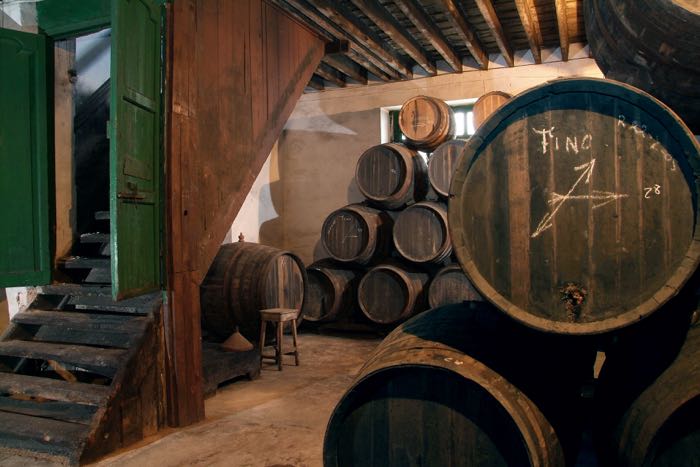From €21.20, £33.30, $62.34
I thought this wine was good. That was when I tasted it a couple of weeks ago in a busy restaurant with lots of competing aromas and distractions, not least the ribeye steak with which it went so bizarrely well (see Sherry, steak and why I love somms).
But then I tasted it again, with more time and in solitude, from a lightly chilled and freshly opened bottle, and it wasn’t good, it was staggeringly good, so complex and distinctive that I found it hard to describe. It is deep browny gold, more golden than you'd expect from amontillado, salty like a fino but then smoky like a brush with lapsang souchong – when you open the cupboard where the tea lives – but then there’s more: dried grasses, an intensely stony mineral aroma, flinty, slightly nutty, but not devoid of fruit, though the fruit – bitter orange, sour apricot and smoky quince – comes out more on the palate. For a sherry it has remarkable freshness (the TA is only 4.39 g/l but the pH is 3.23) and an echoing persistence that leaves me speechless. Hauntingly long. The finish is bone dry but somehow like salted caramel without the sweetness and all the while that smoky tang.
This is without doubt one of the most stunningly complex and beautiful sherries I have ever smelt or tasted, and it is worth every penny, especially when you consider the time it has taken for nature to make it. I have just poured myself a little drop now as I write (it is early evening) and I realise that I had barely noticed the power and richness of the wine because it is so incredibly captivating.
The Emilio Hidalgo business was founded in the early 1870s in the old town of Jerez, where it is still located, and is now run by the fifth generation of that founding family. Please note that this is a different company from the much bigger Bodegas Hidalgo, which makes the well made and widely distributed Manzanilla La Gitana, though many websites seem to think they are the same.
Originally they owned vineyards in Carrascal but they sold these for financial reasons and now have close and long-term relationships with small producers who supply them with high-quality musts. As Fernando Hidalgo emphasised: ‘due to the very long maturation process, the art of blending represented by the solera system, and also the characteristics of the Palomino grape, in the wines that we produce the main influence comes from the bodega where wines are carefully selected and blended rather than from the terroir’.
This long maturation takes place in a solera that was started in 1874: ‘the wine starts as a Fino matured for more than ten years underneath the yeast (flor), and more than five additional years in contact with oxygen, changing its characteristics from that of pure Fino to something unique [ie an Amontillado Fino]. It is always marked by its biological evolution but influenced by the oxidation that occurs over such a long ageing.’
I asked Fernando to explain the marking on the sherry butt shown in the photo below: 'The arrows means that all barrels of this "leg" from down to up, and to the right, are containing the same type of wine. As you know, the solera is not always placed with the bottom part [the oldest wines] close to the ground, but we try to find the best position for each style of wine. In general, we use the more humid spaces to place wines with a biological maturing process (with the flor).'

The name of this wine refers to an old Spanish trick-taking card game for three players called El Tresillo that was particularly popular and fashionable in Spain in the 17th and 18th centuries. Fernando’s ancestors used to play El Tresillo in the winery and they lubricated their game by drinking from this same solera, which is why the wine was eventually named after the card game.
Beware, there are two Emilio Hidalgo sherries with Il Tresillo in their name: this one, referred to on the label as an Amontillado Fino, and a more expensive bottling called Il Tresillo 1874, which is taken from the older butts in the same solera and is labelled Amontillado Viejo. I haven’t tasted the older wine but I suspect it is very good – though I see that when Jancis tasted it a couple of years ago she referred to it as 'a geek's wine'!
According to Wine-searcher, Il Tresillo Amontillado Fino is available in Spain, Austria, Germany, Switzerland, the UK, the US and Ireland.
If you live in London and want to make a sommelier very happy, then I suggest you try this wine at Hawksmoor in Covent Garden, and I am told it is also on the list at Toasted in East Dulwich. If you would rather enjoy it at home, you can buy it directly from importer Les Caves de Pyrène, from one of the four branches of Bottle Apostle in London or from Vino Vero in Leigh-on-Sea, Essex.
Il Tresillo is imported into the US by MundoVino (a member of the Winebow Group). And according to Wine-searcher, Bedford Wine Merchants (Bedford, NY) appear to be selling this at the sale price of $58.99 a bottle but you have to buy a case of six. Metrovino in Calgary, Canada, sells it for C$68 a bottle, and the Il Tresillo 1874 for C$118.














